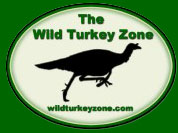|
Whenever you
start calling in a new location, start with
a soft series of yelps or clucks. If you don't
get a response, increase your volume and aggressiveness.
There are times you may have a gobbler close
to you and if you start off loud you will
scare him away.
To keep your
mouth calls in great shape, store them in
a cool, dark place like the refrigerator.
Also, stick a flat toothpick or paper clip
between the reeds to keep them separated while
they are in storage.
Many people ask
what is the best type of turkey call to use.
There really is no set answer to this question.
The best answer is to use the call you are
most comfortable with. It is to your advantage,
however, to learn to use a variety of calls.
I usually mix up my calling by switching types
of calls often until I find one the gobblers
like. Some days that's a mouth call, some
days a box call and so on. Mixing up your
calling will also make you sound like more
than one hen which is often all it takes to
draw in a curious gobbler. I sometimes will
use a mouth call in tandem with a box or friction
call to make myself sound like 2 hens.
When a gobbler
is with hens and will not come in, one of
the best tactics is to try and call the hen
in. First, try to copy exactly the sound the
hens are making. If a hen yelps seven times
come right back with seven yelps. This will
frequently anger the hen and make her come
in looking for a fight. If it does not, get
even more aggressive in your calling by throwing
in some excited yelps and cutts. Hopefully,
this makes her mad enough to come check you
out and bring the gobbler with her.
To add more realism
to your early morning calling, use an old
hen turkey wing to help call in gobblers.
Brush or flap the wing against the tree you're
sitting up against. This will sound like a
turkey moving around in the tree to a gobbler
and is often very effective first thing in
the morning before they fly down from the
roost. When it comes time for the turkeys
to fly down, beat the wing on the ground or
you leg to simulate a hen turkey that is flying
down. Wise old gobblers can sometimes be called
in using the sound of the wing only.
When hunting
a call shy tom, it often helps to scratch
the leaves with your hand. This will imitate
the sound a hen makes when she's feeding and
will often bring an old shy bird right on
in.
Here's a Tip
contributed by Mike Battey --
"When you
use your call it is like saying Spanish "words"
( or a foreign language ) The key to calling
Turkeys is to learn to "speak" Spanish. Your
call is used to communicate a spoken message.
Once "you understand" what you have "said"
and how that applies to a given situation,
you are less likely to call too much and use
the wrong call. Yelping will call more turkeys
and is the safest call to use. Never use your
call to keep "tabs" on your gobbling bird.
Calling is a method of communication ......just
like scratching in the leaves......... once
you "believe" and "understand" what you have
conveyed ......you will call less and have
the patience to wait him out. It is far better
to practice on sitting perfectly still than
to call better. More Turkeys are alive today
from hunters movement ......than bad calling.
I have killed a many a gobbler by the seat
of my pants and the plain yelp of a hen Turkey."
|

